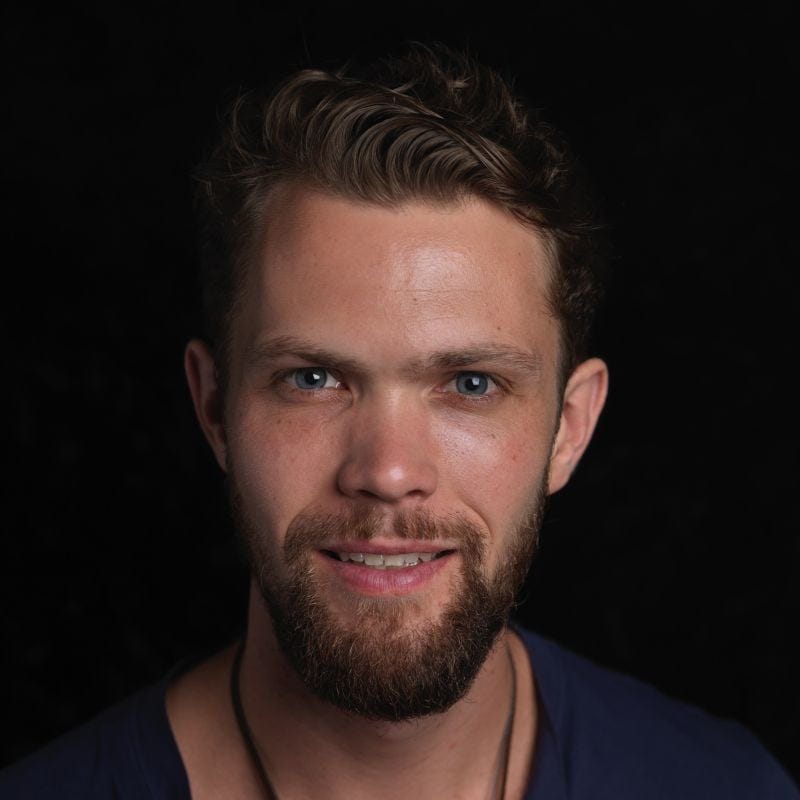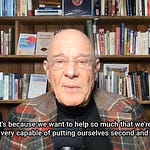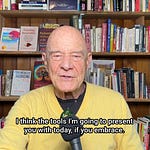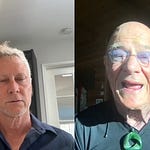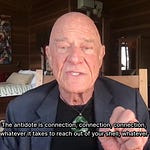Dear Listener,
I'm thrilled to share with you my recent interview with Paul Austin, founder and CEO of The Third Wave, a pioneer in the field of microdosing, and a friend of the show. We had a fascinating conversation about the adverse effects of microdosing and psychedelics in general, as well as how to avoid the errors made by Big Pharma in concealing the side effects of their drugs.
Paul shared the results of his n=1 personal experiment, microdosing LSD for nine months. He talked about the positive changes he noticed in his personality, creativity, and overall well-being. However, he also emphasized the importance of responsible and mindful use of psychedelics.
In our discussion, Paul highlights the need for more research and longitudinal data on the long-term effects of microdosing. He raises thought-provoking questions about how to communicate and educate people about true health and well-being, and how to create systems that support holistic health.
Thank you for being a part of our community, and we hope you find this conversation enlightening and thought-provoking.
Golden Light,
Dr. Richard L. Miller
Mentioned in this Episode…
Psychedelic microdosing benefits and challenges: an empirical codebook - Harm Reduction Journal
Motives and Side-Effects of Microdosing With Psychedelics Among Users
Listen to learn…
How did Paul Austin's nine-month microdosing experiment with LSD impact his extroversion and creativity?
What is the optimal protocol for taking microdoses of LSD according to Jim Fadiman?
How does the dosage of microdosing LSD vary based on individual factors such as body weight and previous psychedelic experience?
What are the potential adverse effects of microdosing LSD, and how can they be managed?
What are the long-term effects of taking a low dose of a psychedelic regularly for an extended period of time?
How can microdosing support personal and societal transformation, as discussed by Paul Austin?
How can income inequality and corporate influence be addressed to promote true health and well-being?
What role do psychedelics play in catalyzing personal and collective transformation, and how can they help individuals reconnect with nature and the environment?
Quotes…
"We don't have great longitudinal data on what happens if you take a low dose of a psychedelic twice a week for the rest of your life." - 00:37:04 to 00:38:20
"We have to ask, how do we communicate and educate people about what it really means to be healthy and to create systems for them that support true health and well-being." - 00:53:55 to 00:55:00
"I truly believe that a lot of depression, addiction, anxiety, it's partly rooted in trauma, which with great psychedelic work and a great therapist, a lot of it can be integrated." - Paul Austin [00:41:44]
"Instead of taking a pill to just get through it, why not ask yourself, am I really living the life that I'm supposed to live?" - Paul Austin [00:41:53]
"Income inequality is higher than it's really ever been in history. And if you look at history, whenever income inequality becomes this substantial, something has to course correct it." - Paul Austin [00:51:20]
"We have to take the power back from corporations that are slowly extracting energy from us for their own personal gain." - Paul Austin [00:53:20]
"We become a culture of consuming and our food supply is toxic because corporations have purchased entire ecosystems." - Paul Austin [00:54:08]
"The more we can intentionally do difficult things, the more freedom of choice we create in how we choose to live." - Paul Austin [00:53:31]
Seeking Psychedelic Testimonials: The Good, the Bad, and the Ugly.
We are currently looking for first-hand accounts of adverse effects of psychedelics—from ‘bad trips,’ to unwanted physiological complications, to abusive practices by guides, therapists, and shamans.
The interviews from this series will go into a forthcoming book on the topic—perhaps the first book its kind.
Please contact me if you would like to be interviewed. You can also leave us a voice message to share your story. We will keep your information anonymous unless you tell us otherwise.
My Books
Freeing Sexuality: Psychologists, Consent Teachers, Polyamory Experts, and Sex Workers Speak Out
Psychedelic Wisdom: The Astonishing Rewards of Mind-Altering Substances
Psychedelic Medicine: The Healing Powers of LSD, MDMA, Psilocybin, and Ayahuasca
Integral Psychedelic Therapy (co-edited with Jason A. Butler & Genesee Herzberg)
NOTE: The podcast is always freely available thanks to our paid subscribers. Please share this post to show your support for transparency. The following transcript distills the key points from this show into a condensed form. It is meant as a reference - listen to the full episode for an accurate rendition of the conversation.
Transcript
Transcript
00:00 - Introduction
[00:00:00] Dr. Richard L. Miller: Welcome to Mind, Body, Health and Politics. I'm your host, Dr. Richard Louis Miller. The mission of Mind, Body, Health and Politics is to enhance your physical and emotional well being and encourage community. I say encourage community because I believe that human beings are basically tribal animals and we live the healthiest, we have the most fun, and they're most effective.
When we associate in our tribes, when we know one another, when we have intimate relationships with one another, when we decrease anonymity and we get to see and be seen. We're friendly tribal animals. We love doing things together. Look at all the things we do, whether it's watching games or playing games, or sewing circles or playing poker, or going out and bicycling together, or eating together.
We really love eating together. Humans love getting together in a small circle and sharing food. That's been going on for all of recorded history. We also must remember, though, that a very small percentage of us are not cooperative, collaborative animals. A very small percentage of who we are are predators and they are a very different tribe.
For predators would have the rest of us live as subjects rather than as citizens. They would control us. They believe that the strong are meant to lead and the rest are meant to follow. It's very different from what our founders wanted when we started. This experiment as a democracy and a [00:01:40] republic. And if we want to keep this experiment going in democracy and in republic, we've got to stay aware and we've got to vote and really stay awake.
And I know that's asking a lot at a time in history when 60 percent of us are living paycheck to paycheck. It's an unacceptable, reprehensible situation that's been created which needs to be changed. But even during this period of change and transition, we must stay awake and vote so that we have an opportunity to maintain our democracy and our republic and not go the way of so many other countries in the world which are descending into dictatorships with tyrants leading the people as subjects. In the words of one of my great heroes, Thomas Jefferson, eternal vigilance is the price of liberty. One person who's expressed his liberty very strongly by self experimenting with psychedelics and then building a program for teaching others how to experiment with psychedelics safely. With us today is pioneer Paul Austin.
Welcome to Mind, Body, Health, and Politics, Paul.
02:58 - Paul's Microdosing Experiment
[00:02:58] Paul Austin: It's great to be back. Thanks for having me on the show again, Richard.
[00:03:02] Dr. Richard L. Miller: Yes, we discussed before the show about your famous experiment where you microdosed LSD twice a week for nine months. Could you give us a brief refresher on the outcome of that self-experimentation?
[00:03:26] Paul Austin: I began this experiment in July 2015 while living in Budapest. I was 24 at the time and had previously experienced higher doses of LSD, which I found transformative. After these high-dose experiences, I would feel more connected, present, and alive for a week or two before the afterglow faded. When I learned about microdosing from Jim Fadiman, I wondered if it could extend this afterglow. I had two main intentions: one was to reduce my alcohol intake, as I was somewhat reliant on alcohol for social connection. I thought LSD could be a healthier alternative. The second intention was to enhance focus and productivity for my business, fostering a flow state. I would microdose once during the week for work and focus, and then again on the weekend for social gatherings, aiding in vulnerability and openness.
I found microdosing twice a week for nine months effective in achieving these goals. LSD has an intensity, so I took a break for several months afterward. Now, I microdose intuitively, occasionally using psilocybin mushrooms or LSD. It helps lift my mood and adds a sparkle to my life, especially during challenging times.
[00:06:15] Dr. Richard L. Miller: For those unfamiliar with your story, could you describe the personality changes you noticed during and after the nine-month period? These changes were quite significant, as I recall.
06:39 - Personality Changes from Microdosing
[00:06:39] Paul Austin: One notable change was increased openness. I've always been introverted, but microdosing helped me develop and embrace my extroverted side. I became more willing to connect and communicate. Another change was a boost in creativity. Although I never considered myself a creative visionary, microdosing LSD regularly unlocked new ideas and perspectives. I found myself journaling extensively, generating thoughts that previously seemed inaccessible.
The third change was in energy levels. LSD, being stimulating, meant that after microdosing regularly, I was more active and involved in life. This complemented my existing health-conscious lifestyle. As a former college athlete who paid attention to my diet, microdosing further refined and optimized my approach to life.
08:45 - Optimal Microdosing Protocols
[00:08:45] Dr. Richard L. Miller: You mentioned Jim Fadiman, who likely has the most extensive collection of microdosing anecdotes. In his book "The Psychedelic Explorer's Guide," he recommends microdosing LSD once, followed by two days off, about twice a week, to allow neurotransmitters to replenish. Is that the protocol you followed?
[00:09:27] Paul Austin: Yes, for classic psychedelics like LSD, psilocybin, or mescaline, there's a 48-hour tolerance window. If you take an LSD microdose on one day, taking it the next day won't have the same effect because the serotonergic receptors haven't reset. Jim Fadiman's protocol of dosing twice a week, with a day on and two days off, suits LSD due to its stimulating nature. This differs from psilocybin mushrooms, which are less stimulating and involve less dopamine. Paul Stamets suggested a different protocol for psilocybin microdosing: four days on, three days off, or every other day. I've tried LSD microdosing every other day, but after a couple of weeks, it felt overly stimulating, akin to entering a manic phase.
[00:11:01] Dr. Richard L. Miller: What does that overstimulation feel like? Is it similar to too much coffee or an amphetamine, or is it different? Can you describe it?
11:16 - Subjective Effects of LSD Microdoses
[00:11:16] Paul Austin: The stimulation from LSD is more expansive than the effects of caffeine or methamphetamines. While those drugs can induce a kind of tunnel vision or feel constrictive, LSD maintains a sense of energy and movement but with an expansive, flexible, and playful perspective. This is why I find it excellent for creativity. It combines motivation with playfulness and creativity, striking a balance between seriousness and structure with fun and spontaneity. In my experience, LSD microdosing is a middle way that fosters productive creativity.
[00:12:41] Dr. Richard L. Miller: Let's discuss dosage, as it's closely linked to the experience. Microdosing usually involves ten to twenty or twenty-five micrograms. Do you agree with that range?
13:18 - Legality Issues Around Psychedelics
[00:13:18] Paul Austin: Body weight, tolerance, history of SSRIs, and neuroticism can all influence the appropriate microdose. People with no prior psychedelic experience may need more initially, but as they become more sensitive and attuned, they may require less. Some might find five micrograms adequate, while others might need 25 to 35 micrograms. It's context-dependent, and the key is to start low and go slow. You can always take more, but you can't take less once you've started. For those new to this or looking to fine-tune their experience, beginning with a lower amount is advisable. Find the point where you start to notice a substantial shift, then adjust slightly below that level. For example, if 20 micrograms feels overwhelming, try reducing to 15 micrograms.
[00:15:15] Dr. Richard L. Miller: In the study of psychedelic science, transparency is crucial, unlike Big Pharma, which has a history of hiding unfavorable results. I'm writing a book called "Psychedelics, Adverse Effects," and I invited you to discuss the potential adverse effects of LSD based on your extensive experience with people who have microdosed.
[00:16:31] Dr. Richard L. Miller: Recently, a couple, both doctoral level therapists, took what they thought was a microdose of 25 micrograms. The woman felt no effect, but the man experienced agitation and discomfort. This wasn't a severe bad trip, just internal unease. The issue might be dose-related, as 25 micrograms could be too high for some and too low for others. I'd like to hear about your experiences with adverse effects and what people should be aware of in this regard.
17:44 - Emotional Effects and "Shadow Work"
Indeed, agitation or unease experienced during microdosing might be linked to underlying emotions or feelings that are partially accessed but not fully released due to the dosage. Movement and physical activity can help release these emotions.
Another interesting observation is that some individuals report feeling sleepy while microdosing, both with LSD and psilocybin. This can be surprising to those expecting increased productivity or energy. This response aligns with the idea that psychedelics often provide what you need, not necessarily what you want. This effect might be linked to the substance's impact on homeostasis, helping to bring the body back into balance. If someone is overstimulated, microdosing might help them relax and find calm; if lethargic or depressed, it could provide an energy boost.
This balancing effect is similar to adaptogens like Ashwagandha and Rhodiola, which help regulate the body's stress responses. Microdosing seems to have a comparable adaptogenic effect, promoting overall balance.
Public narratives around microdosing often set specific expectations – improved productivity, creativity, or help with depression and addiction. While these outcomes can occur, microdosing also often involves confronting and processing repressed emotions or 'shadow work.' This can bring up anger, sadness, grief, or other emotions that need to be addressed.
For those new to inner work, the surfacing of these emotions during microdosing can be challenging. It's important to recognize that addressing these repressed feelings can lead to greater wholeness, creativity, and energy, facilitating a transformative process.
27:10 - Meeting Inner Dragons
[00:24:29] Dr. Richard L. Miller: From a clinical perspective, having the 'dragon' emerge during a psychedelic experience can be beneficial. If it's been lurking under normal consciousness and the psychedelic brings it into the light, there's an opportunity to confront and understand it. This process can lead to a stronger sense of self and the confidence that comes from facing difficult truths.
[00:25:09] Paul Austin: That's why having a guide, coach, therapist, or supportive friend is vital, even with lower doses of psychedelics. Many people think they can navigate these experiences alone, but when challenging emotions or difficult processing arise, it's crucial to have professional or knowledgeable support. The process often requires going through deeper work to emerge lighter, more present, and wiser. However, finding the courage to face these challenges can be difficult.
[00:26:21] Dr. Richard L. Miller: Taking large doses of psychedelics requires courage, especially considering the potential of facing new or difficult aspects of oneself. With a good guide or ally, these challenges can be met together, building confidence. In my experience and observations, this can be transformative.
Regarding research on adverse effects of psychedelics, one common concern is the legality of these substances. A study mentioned that 29% of respondents viewed doing something illegal as an adverse effect. What are your thoughts on this?
[00:27:10] Paul Austin: When asked about the risks of microdosing or psychedelics, I often say that their illegality is the most significant risk. Since our first conversation in 2016, the legal landscape has evolved. Colorado legalized certain plant medicines like psilocybin, and the FDA is nearing the approval of MDMA for PTSD treatment, based on MAPS phase three trials. However, these substances remain illegal, influencing set and setting. The anxiety or paranoia from their illegality can be intensified by the psychedelic experience. While the actual risk is low and the DEA prioritizes other drugs like fentanyl, cocaine, and crystal meth, most people are uncomfortable breaking the law, creating a mindset of doing something wrong.
Concerns arise about what could happen in this context. For instance, if someone attends an underground psilocybin ceremony and experiences unethical behavior from the facilitator, they lack recourse. They can't comfortably report such incidents to the police due to the illegal nature of the activity. This secrecy and lack of transparency parallel certain pharmaceutical companies' tendencies to conceal data. The underground, prohibited status of psychedelics can make people feel unsafe in these environments. Since our last discussion, Third Wave has launched a directory of trustworthy retreats, clinics, coaches, and therapists to ensure safety and ethics in this field.
Addressing adverse effects, the primary risk as psychedelics become more accessible is unethical practitioners exploiting the hype for profit or predatory purposes. This reflects the human tendency towards community and connection, but also acknowledges that a small percentage of people are psychopathic. Ensuring protection in this field is challenging due to the lack of formal oversight mechanisms like board certification for physicians. Identifying whom to report unethical underground facilitators to remains a significant challenge in this third wave of psychedelics.
32:15 - Underground Psychedelic Therapy
[00:31:58] Dr. Richard L. Miller: I find it very interesting that these various guides, therapists, and facilities allow you to list them publicly, essentially exposing themselves, aren't they?
[00:32:15] Paul Austin: The requirement for listing is legality. Many of the retreats we list are in Jamaica, the Netherlands, Mexico, and Costa Rica. The clinics we feature are integrative ketamine clinics, as ketamine is a legal psychedelic medicine. We're not listing underground shamans or facilitators.
[00:32:39] Dr. Richard L. Miller: Even the Changa Institute in Portland, which has graduated the first cohorts of government-authorized psychedelic guides and has already graduated seven cohorts, is still doing something illegal in the eyes of the federal government, despite being legal and authorized by the state of Oregon.
[00:33:12] Paul Austin: This is expected to come to a head in 2024 or 2025. The difference between cannabis and psychedelics is significant. Cannabis is seen as a recreational alternative to alcohol, while psychedelics are more akin to a healthcare practice, delving into medical issues and trauma. The FDA holds a monopoly on medical treatments in the U.S. There's likely to be a confrontation or significant event where the federal government acknowledges the widespread use of psychedelics for depression, while states like Oregon argue for its therapeutic use. It will be interesting to see how this dynamic between the FDA and states like Oregon, Colorado, and potentially California unfolds, as it resembles the wild west.
[00:34:39] Dr. Richard L. Miller: We've discussed the adverse effects of illegality and the anxiety it can cause. What other adverse effects are there, not just from full doses of LSD and psilocybin, but also from microdosing? Even if the percentages are small, like 2.7%, which can be significant depending on the number of subjects.
34:39 - Income Inequality and Health
[00:35:28] Paul Austin: Jim Fadiman's research in 2017 revealed that individuals with red-green color blindness experienced tracers when microdosing. He also found that lithium is contraindicated with low doses of psychedelics. Other medications are generally safe to combine with psilocybin microdoses, but not lithium. This aligns with the understanding that conditions like schizophrenia, bipolar disorder, and borderline personality disorder present increased risks. While some research shows that bipolar disorder can be positively affected by ayahuasca, generally, these cases are considered risky.
The main concerns include a sense of overwhelm, anxiety, agitation, and issues stemming from prohibition. A physical risk that has gained attention is heart valvulopathy and myocarditis. This concern arose from the drug fenfen, a weight loss medication from the 1990s, which was linked to heart-related issues due to overactivating the 5-HT2B receptor. LSD and psilocybin activate this receptor much less intensely, but the long-term effects of low-dose psychedelic use remain unclear.
Microdosing can be a useful catalyst for change, aiding in overcoming depression, integrating material, or combating addiction. However, incorporating breaks and enhancing lifestyle habits like healthier eating, exercise, better sleep, deeper relationships, meditation, and breathwork are crucial. Microdosing shouldn't replace antidepressants but be viewed as a tool to gain new perspectives and catalyze lifestyle changes. While there's no comprehensive data on the long-term safety of consistent microdosing, it's important to approach it with caution, understanding that we're somewhat guinea pigs in this evolving field. Life isn't entirely safe, and seeking complete safety could result in a lack of engagement with life's mysteries.
36:41 - Creating Healthy Systems
[00:35:28] Paul Austin: Jim Fadiman's research in 2017 revealed that individuals with red-green color blindness experienced tracers when microdosing. He also found that lithium is contraindicated with low doses of psychedelics. Other medications are generally safe to combine with psilocybin microdoses, but not lithium. This aligns with the understanding that conditions like schizophrenia, bipolar disorder, and borderline personality disorder present increased risks. While some research shows that bipolar disorder can be positively affected by ayahuasca, generally, these cases are considered risky.
The main concerns include a sense of overwhelm, anxiety, agitation, and issues stemming from prohibition. A physical risk that has gained attention is heart valvulopathy and myocarditis. This concern arose from the drug fenfen, a weight loss medication from the 1990s, which was linked to heart-related issues due to overactivating the 5-HT2B receptor. LSD and psilocybin activate this receptor much less intensely, but the long-term effects of low-dose psychedelic use remain unclear.
Microdosing can be a useful catalyst for change, aiding in overcoming depression, integrating material, or combating addiction. However, incorporating breaks and enhancing lifestyle habits like healthier eating, exercise, better sleep, deeper relationships, meditation, and breathwork are crucial. Microdosing shouldn't replace antidepressants but be viewed as a tool to gain new perspectives and catalyze lifestyle changes. While there's no comprehensive data on the long-term safety of consistent microdosing, it's important to approach it with caution, understanding that we're somewhat guinea pigs in this evolving field. Life isn't entirely safe, and seeking complete safety could result in a lack of engagement with life's mysteries.
[00:40:37] Dr. Richard L. Miller: Suppose someone listening has been depressed since the pandemic, and they're on an SSRI, taking it daily but questioning its effectiveness. They might ask you, Paul Austin, why not switch to microdosing twice a week? This would reduce their dosage significantly, from daily use to about a hundred times a year. What are the flaws in this reasoning?
[00:41:31] Paul Austin: Transitioning to microdosing could be a great strategy, potentially useful for a year or two. My guiding principle is sovereignty—I want to feel empowered, capable, and always in control, regardless of the substance I'm using. Much of depression, addiction, and anxiety stems from trauma, which can often be integrated through effective psychedelic work and therapy. It also relates to our environment. Instead of merely using a pill to cope, it's worth asking if we are truly living the life we're meant to live. Are we in the right place, with the right people, and free from abusive or addictive relationships? Transitioning from SSRIs to low-dose psychedelics is a positive step. The goal is to reach a point where use is occasional, not rigidly twice a week for life. It might be once every other week, or several times in one week followed by a month-long break. Having the intuitive ability to sense what's appropriate, rather than adhering to a strict routine, offers more freedom in making life choices.
[00:43:43] Dr. Richard L. Miller: Now, I'd like to shift to a different topic. How do you think humans are doing in terms of taking care of themselves as a species on this planet?
[00:44:08] Paul Austin: That's a multifaceted question. On one hand, if we consider the larger collective, many would argue that since the Enlightenment and Industrial Revolution, millions, if not billions, have risen out of poverty. We have access to amenities like heating, hot showers, and various machines for convenience. This level of comfort means many of us no longer struggle for basic survival, which is a significant positive development. However, the downside is that we've become too comfortable, leading to unhealthy lifestyles like consuming junk food and excessive screen time. A major risk for us as a species is viewing ourselves merely as cogs in the industrial world. The crucial task for our generation is to remember that we are not machines. We're complex beings, deeply connected to nature, with emotions, the need for rituals, and a dependence on the integrity of our natural environment.
Our upbringing in a world focused on industrial materialism has led us to see ourselves as separate from nature. I believe psychedelics play a crucial role in reminding us of the importance of a reciprocal relationship with the natural world. It's a challenging path, but I'm optimistic that psychedelics can be allies in rekindling this essential connection for both individual and collective flourishing.
[00:47:18] Dr. Richard L. Miller: Paul, when I started this program in 2005, approximately 40% of the United States population was obese or overweight. When you first joined the program around 2016 or 2017, this number had increased to about 65%. Currently, as of today, 72% of the country is classified as obese or overweight. Based on this trend, my colleagues predict that by 2030, over 50% of the United States will be obese and around 37% will be overweight. This means that a total of 87% of the country's population will be obese or overweight in just seven years [00:48:20] before you even turn 40, if my calculations are correct. You'll be around 39 years old, if I'm close. So, let's simplify the numbers.
By the time Paul Austin reaches the age of 40, 72% of the population in his country will be obese. I mean, 87% of the population in his country will be obese or overweight. And Paul will be part of a small minority, representing only 13% of people who are in good shape. Now, what do you think this data is telling us about ourselves as a society?
What message are we conveying? What does it say about us? What statement are we making?
[00:49:08] Paul Austin: Well, I think one of the reasons is that we have become so accustomed to convenience that we no longer want to put in any effort to feed ourselves. It's like living in pods, similar to the concept of the matrix. Another reason is the lack of education on nutrition and health, especially regarding the toxic state of the food supply in the United States. People pay little attention to what they eat and how they take care of their bodies.
The third aspect is our desire for everything to be easy. This convenience has made us soft, entitled, and unaware. However, intentionally engaging in difficult activities, like taking daily cold plunges at 39 degrees Fahrenheit for three minutes, can have significant health benefits. Overall, our culture has become one of consumption, and our food supply is toxic due to the control corporations have over the entire ecosystem. It is a toxic combination of corporatism, industrialism, and convenience that is slowly, if not quickly, harming Americans.
[00:51:16] Dr. Richard L. Miller: What can we do about it, Paul?
[00:51:20] Paul Austin: Well, for me, there is an interesting divide. On one hand, there are individuals who take full responsibility and sovereignty for their own well-being and health. They are awakening to the flaws of the system we were born into and are choosing to step outside of it. They are purchasing land in Texas, California, and Costa Rica. They are forming communities and supporting local businesses. However, this only represents a small percentage of the population. Many of my friends and community members are part of this group, and they are determined to build a new system.
I don't want to be part of this. So I think that's the first step, just saying, "I don't want to be part of this" and recognizing that those who stay within this broken system... You know what? Like, people have to make a choice and decision for themselves to take responsibility for their well-being. Even with all the education in the world, even if the science is clear, people have to make that choice.
I think that's immediate. In the longer term, we need to shift public health and how we talk about nutrition and movement. We need to change our legal system around psychedelics and alternative forms of healthcare. We have to reclaim power from corporations that are exploiting us for their personal gain and ask ourselves, "How do we build and create ecosystems that are more integrated and inclusive for all of humanity?"
So, it's a lot. We could probably spend an entire podcast episode on it.
But for me, a lot of it comes down to first, each of us taking individual responsibility for our own well-being. And then, as that grows more and more, we need to think about how we communicate and educate people about what it truly means to be healthy and how to create systems that support them.
[00:53:55] Dr. Richard L. Miller: Currently, sixty percent of the United States population is living paycheck to paycheck. This is another strong statement, highlighting the challenging financial situation faced by many.
[00:54:08] Paul Austin: It's difficult right now, and it's only getting more challenging. Some people believe that universal basic income could save us, but the reality is that income inequality has reached unprecedented levels. Throughout history, when income inequality becomes this significant, some form of correction is necessary.
Many of us hope that this correction can happen without resorting to the typical historical requirement of conflict, war, and death. Addressing income inequality is, in my opinion, the most pressing issue today. It represents a gross misallocation of resources and it would benefit everyone if we could find a way to level the playing field.
This is the tricky part. Communism tried that, but communism was worse than capitalism.
[00:55:33] Dr. Richard L. Miller: Let me correct you. Communism has never been tried. What has been tried is a cartel gangster flying the flag of communism, but in reality, it's just a group of thugs, whether in China or Russia. They are not practicing true communism because true communism does not involve killing people, arresting people, or suppressing freedom of speech.
So, in your words, which are important to me as well, there is no personal sovereignty. Therefore, we don't know if communism could actually work. The closest examples we have are the Scandinavian countries, which practice a form of socialism and seem to be successful. Let me leave you with this thought, since our time together is coming to an end, Paul. It's your generation, those in their thirties, plus or minus ten years, including people in their twenties and mid-forties, who will have to make the change. It won't come from us, and it won't come from you looking for leadership.
It will be up to you, the people, to become leaders and create a long-term plan, perhaps a 20-year plan, to bring about the changes you believe are necessary. As pioneers in psychedelics, you have the potential to be pioneers in social change as well. Your work in psychedelics already contributes to social change, of course.
However, in an even greater sense, you can spread the message to individuals between the ages of 25 and 45 that the time for action has arrived. But remember, do not seek out leaders; instead, cultivate leaders within your own group. Do not look for guides; question everything and establish your own principles. Thomas Jefferson once said that the constitution should be rewritten every twenty years to reflect a new generation.
While we have had a remarkable constitution for a couple of hundred years, serving as a guiding principle for the world, there are certain aspects that need to be changed, as you mentioned today, Paul Austin. One of these is the influence of corporations on the state. Granting corporations personhood in this country was a blow to democracy and the republic.
Allowing lobbyists to operate freely, instead of treating them as the bribe-givers and felons they truly are, is another threat to democracy and the republic. In Europe, offering a politician a lavish meal, a ride on a private jet, or the company of multiple women would result in arrest for bribery and a felony charge. However, in this country, such actions are entirely legal.
How can we expect congressmen to remain honest if we do not question at what level of bribe each one will fold? Will it be at 30 million? 50 million? 100 million? Or will they be swayed by threats against their loved ones? We need a new approach. It is now in your hands, and I will leave it to you until our next interview. When you return, I would like to hear some of the ideas you are sharing with others in your age group about how we can bring about this change.
[00:59:23] Dr. Richard L. Miller: That's my homework assignment.
[00:59:26] Paul Austin: I look forward to that conversation. Thank you for having me on again today, Richard. It was fun.
[00:59:34] Dr. Richard L. Miller: I'm glad it was fun. And thank you, Paul, for everything you've contributed to us and for being here today on mind, body, health, and politics. And thank you, gentle listeners, for being here today as well. I want to remind you that we produce a new show every Tuesday at nine o'clock. However, most of you don't listen at nine o'clock on Tuesday morning, Pacific time. Instead, you listen to the archive.
So I [01:00:00] remind you the archive on mind, body, health, and politics is open source. That means it's free for listening. And we have some of the greatest minds on the planet on this program. Also, let me throw in a commercial for my latest book, "Freeing Sexuality." I think you'll find it a fun read. Until next time, this is Dr. Richard Louis Miller reminding you that good health is worth fighting for and is essential for life, liberty, and the pursuit of happiness.

